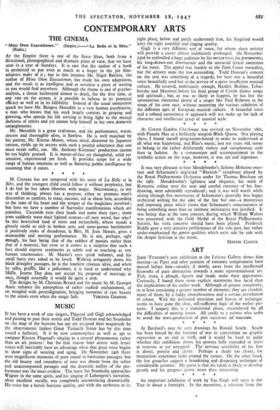MUSIC
IT has been a week of star singers, Flagstad and Gigli acknowledged and passing or past their zenith and Todd Duncan and Set Svanholm on the map of the heavens but not yet assigned their magnitude by the observatories (unless Great Turnstile Street has by this time issued a bulletin). It is by now commonplace as well as apt to compare Kirsten Flagstad's singing to a natural phenomenon rather than an art process : but for that reason finer artists with lesser voices will inevitably have an advantage when that great voice begins to show signs of wearing and aging. On November 24th there were magnificent moments of pure sound in fortissimo passages, but the old beauty and roundness of tone was absent from the softer and unaccompanied passages and the dramatic nullity of the per- formance was the more evident. The tenor Set Svanholm approaches Wagner in the same spirit, and his singing of Lohengrin's narration, often excellent vocally, was completely unconvincing dramatically. His voice has a heroic baritone quality, and with the orchestra in its
right place, below and partly underneath him, his Siegfried would have the right youthful and ringing quality.
Gigli is a very different sort of tenor, for whom sheer artistry will provide a career almost indefinitely prolonged. On November 23rd he enthralled a huge audience by his mezza voce, his portantento, his long-drawn-out diminuendo and the unvaried lyrical sweetness of his voice. The appeal was frankly to the Palm Court mentality, but the artistry none the less astounding. Todd Duncan's concert on the 21st was something of a tragedy, for here was a beautiful' voice beautifully used but in the service of a quite insufficient musical culture. He essayed, ambitiously enough, Handel, Brahms, Tchai- kovsky and Massenet before his final group of Creole dialect songs and spirituals ; but, as was so likely to happen, he has lost the spontaneous emotional power of a singer like Paul Robeson in the songs of his own race, without mastering the various subtleties of the different ages of European musical culture. A beautiful voice and a refined earnestness of approach will not make up for lack of character and intellectual grasp of musical style.
* * *
At Covent Garden Checkmate was revived on November ath, with Pamela May as a brilliantly waspish Black Queen. Not playing chess, I found myself programme-bound in order to understand at all what was happening, and Bliss's music, just ten years old, seems to belong to the rather deliberately violent and cacophonous style then in. fashion. As a commentary and accompaniment to the symbolic action on the stage, however, it was apt and ingenious.
* * * *
It was very pleasant to hear Mendelssohn's Scheme Melusine over- ture and Schumann's neglected " Rhenish " symphony played by the Royal Philharmonic Orchestra under Sir Thomas Beecham on the r9th. Mendelssohn's lightness and elegance, his wash of Romantic colour over the neat and careful contours of his line- drawing, were admirably reproduced; it was well worth while sitting through five movements of Schumann's generally less happy orchestral writing for the sake of the last but one—a mysterious and imposing piece which shows that Schumann's consciousness of being something more than an intimate miniaturist was justified. It was fitting that at the same concert, during which William Walton was presented with the Gold Medal of the Royal Philharmonic Society, his viola concerto should have been played. Frederick Riddle gave a very sensitive performance of the solo part, but rather under-emphasised the gamin qualities which exist side by side with the deeper lyricism in the music.
MARTIN COOPER.




























 Previous page
Previous page